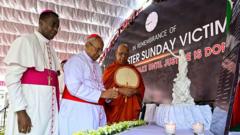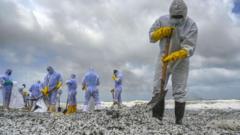The Vatican has officially designated those who lost their lives in the 2019 Sri Lanka Easter bombings as "heroes of faith," a title announced by Cardinal Malcolm Ranjith during a commemorative event marking the sixth anniversary of the tragedy.
Sri Lanka's Easter Bombing Victims Honored as 'Heroes of Faith'

Sri Lanka's Easter Bombing Victims Honored as 'Heroes of Faith'
Vatican recognizes 167 victims of the 2019 attacks as part of the sixth anniversary commemoration.
The Vatican recognized 167 victims who died in the Easter Sunday attacks, where suicide bombers targeted Catholic churches and luxury hotels, resulting in a total of 269 fatalities. This horrifying event marked a jarring return to violence for Sri Lanka, which had seen relative peace since the civil war's end in 2009. However, investigations into the bombings have faced intense scrutiny and controversy.
While Muslim extremist groups claimed responsibility for the attacks, families of victims alongside the Christian community have accused the government of negligence, alleging that intelligence warnings were either ignored or mishandled. The Supreme Court ruled that former President Maithripala Sirisena should compensate victims for failure to act on actionable intelligence.
In 2021, a trial began for 25 individuals charged with orchestrating the attacks, but the overwhelming volume of evidence and charges has raised concerns about protracted legal proceedings. Moreover, the Cardinal has voiced suspicions that the investigations were deliberately obscured to shield powerful figures behind the attacks.
Political dimensions have further complicated the aftermath; the current government suggested a conspiracy to manipulate the situation for political gain, citing the opportunity that arose for political candidates after the tragedy. Prime Minister Harini Amarasuriya's recent statement underscored the new administration's commitment to pursue justice and clarify the events surrounding the catastrophe, emphasizing the importance of transparency and accountability to honor the victims' legacy.
As memorials continue, the families desire not only remembrance for their loved ones but also answers and justice, fueling ongoing public dialogue about the tragic events of that fateful Easter Sunday in 2019.
While Muslim extremist groups claimed responsibility for the attacks, families of victims alongside the Christian community have accused the government of negligence, alleging that intelligence warnings were either ignored or mishandled. The Supreme Court ruled that former President Maithripala Sirisena should compensate victims for failure to act on actionable intelligence.
In 2021, a trial began for 25 individuals charged with orchestrating the attacks, but the overwhelming volume of evidence and charges has raised concerns about protracted legal proceedings. Moreover, the Cardinal has voiced suspicions that the investigations were deliberately obscured to shield powerful figures behind the attacks.
Political dimensions have further complicated the aftermath; the current government suggested a conspiracy to manipulate the situation for political gain, citing the opportunity that arose for political candidates after the tragedy. Prime Minister Harini Amarasuriya's recent statement underscored the new administration's commitment to pursue justice and clarify the events surrounding the catastrophe, emphasizing the importance of transparency and accountability to honor the victims' legacy.
As memorials continue, the families desire not only remembrance for their loved ones but also answers and justice, fueling ongoing public dialogue about the tragic events of that fateful Easter Sunday in 2019.




















